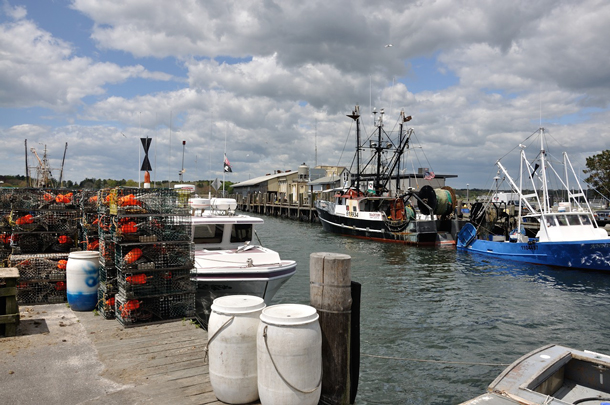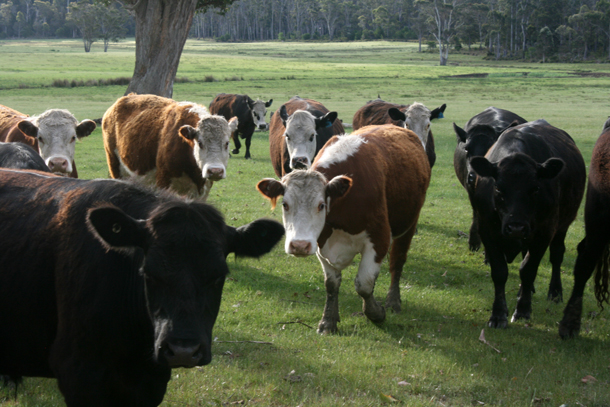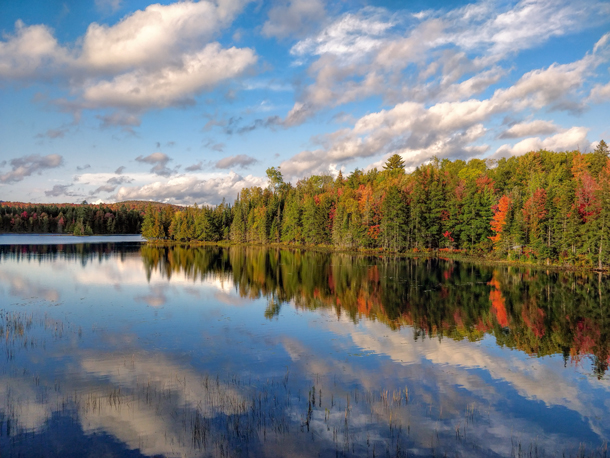Beyond the Headlines
Air Date: Week of May 15, 2020

A commercial fishing dock in Stonington, Connecticut. (Photo: Phoca2004, Flickr, CC BY-NC-ND 2.0)
In this week's trip beyond the headlines, Environmental Health News editor Peter Dykstra and Host Steve Curwood examine an executive order that might threaten traditional fishing practices. Then, the pair discuss "climate-smart milk", from dairy cows that have been fed dietary supplements said to reduce the amount of methane they produce. Finally, the two look back through history to the creation of the Adirondack Park Forest Preserve, 135 years ago to help assure clean water for New York City.
Transcript
CURWOOD: It's time now to take a look Beyond the Headlines with Peter Dykstra. Peters, an editor with Environmental Health News. That's ehn.org and dailyclimate.org. On the line now from Atlanta, Georgia. What stories do you have for us today, Peter?
DYKSTRA: Hi, Steve. Last week, President Trump signed an executive order that has both environmentalists and commercial fishermen concerned the order would pave the way for the culture operations that could threaten traditional fishers, particularly on the east coast where saltwater fish grown in pens isn't really a thing yet.
CURWOOD: Yeah, the commercial fisher people don't like this at all. They say it's gonna make a mess, right?
DYKSTRA: Yeah, there are several issues among them contamination, actually, pollution of ocean waters from fish feed contamination of the ocean ecosystem when those fish inevitably escape. Fish like tilapia that are popular in grocery stores, but that aren't a part of the East Coast ecosystem. There are big concerns already with overfishing on the East Coast, warming ocean waters, are moving traditional ranges of food fish like summer flounder, moving it from off the Carolina coast - far, far North.
CURWOOD: Well, it sounds like the notion of having fish and pens would be a major haddock for the seafood industry.
DYKSTRA: Steve that's a bad pun. This is a serious topic. And I'm not just bringing it up for the halibut.
CURWOOD: Oh my goodness. Hey, so what else do you have for us today?
DYKSTRA: There's an intriguing story from the UK a place called Brades Farm it's a dairy operation in Lancashire is marketing what it calls climate smart milk.
CURWOOD: Oh, that would be nice. I mean, cattle, whether raised for meat, cheese or milk are considered to be climate un-smart.

It is estimated that cattle and other ruminants are responsible for about 37 percent of global methane emissions that result from human activity. (Photo: Steven Penton, Flickr, CC BY 2.0)
DYKSTRA: Yeah, cows' digestive systems produce a large amount of methane which enters the atmosphere via both ends of the cow but mostly through burps. Brades Farm feeds its herd a garlic supplement made in Switzerland and called, wait for the new pun, Mootral.
CURWOOD: Okay. How proven is this technology, Peter?
DYKSTRA: It's not proven yet. It hasn't caught on. If it does, it would be a big deal. As you know, methane is at least 80 times as potent a greenhouse gas as CO2. Cattle are a big contributor to the methane problem. And this would potentially solve at least a little bit of the contribution of agriculture to climate change.
CURWOOD: I'm a little skeptical of this, Peter, because in my youth, I worked on dairy farms. If the cows got into what we called onion grass, you taste it in the milk.

Lake Abanakee in the Adirondacks. (Photo: Sagesolar, Flickr, CC BY 2.0)
DYKSTRA: Yeah, but if this does work, it's a rare case where garlic will actually improve the breath of cattle.
CURWOOD: Okay, let's take a look back in history, Peter, and what are we going to talk about?
DYKSTRA: 135 years 135th anniversary, May 15 1885, the New York State Legislature created the Adirondack Park Forest Preserve in far upstate New York. It's a massive area about two-thirds the size of the state of Rhode Island. They wanted not only to protect a beautiful area from development, but also protect the source of the Hudson River, much of New York's water supply.
CURWOOD: And New York has fairly good water for a major metropolitan area, doesn't it?
DYKSTRA: They do. And that same year 1885, they made much of the Catskills. That's a small mountain range much closer to New York City into Catskill State Park. It's now the home of several reservoirs created to serve Metro New York and like the Adirondacks, it's home not only to beautiful scenery, some of the best biodiversity in the eastern US, but also this time of year, some of the most bodacious black flies I've ever been swarmed by.
CURWOOD: All right. Well, thanks, Peter. Peter Dykstra is an editor with environmental health news that’a ehn.org and dailyclimate.org. We'll talk again real soon.
DYKSTRA: Okay, Steve, thanks a lot. Talk to you soon.
CURWOOD: And there's more on these stories at the Living on Earth website, loe.org.
Links
Living on Earth wants to hear from you!
Living on Earth
62 Calef Highway, Suite 212
Lee, NH 03861
Telephone: 617-287-4121
E-mail: comments@loe.org
Newsletter [Click here]
Donate to Living on Earth!
Living on Earth is an independent media program and relies entirely on contributions from listeners and institutions supporting public service. Please donate now to preserve an independent environmental voice.
NewsletterLiving on Earth offers a weekly delivery of the show's rundown to your mailbox. Sign up for our newsletter today!
 Sailors For The Sea: Be the change you want to sea.
Sailors For The Sea: Be the change you want to sea.
 The Grantham Foundation for the Protection of the Environment: Committed to protecting and improving the health of the global environment.
The Grantham Foundation for the Protection of the Environment: Committed to protecting and improving the health of the global environment.
 Contribute to Living on Earth and receive, as our gift to you, an archival print of one of Mark Seth Lender's extraordinary wildlife photographs. Follow the link to see Mark's current collection of photographs.
Contribute to Living on Earth and receive, as our gift to you, an archival print of one of Mark Seth Lender's extraordinary wildlife photographs. Follow the link to see Mark's current collection of photographs.
 Buy a signed copy of Mark Seth Lender's book Smeagull the Seagull & support Living on Earth
Buy a signed copy of Mark Seth Lender's book Smeagull the Seagull & support Living on Earth

